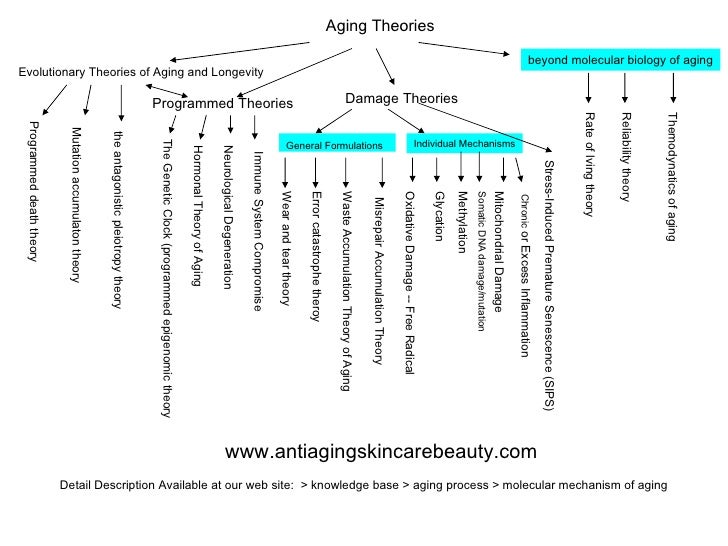Theory Of Aging
However theorists have increasingly been developing and implementing more interdisciplinary theories such as the convoy theory of social support. David Sinclair and Dr.

Theories Of Aging Theories Of Aging Nursing Theory Aging
2 DAMAGE-BASE THEORIES OF AGING 21 Free Radical Theory First proposed by Denham Harman in the 1950s the free radical theory of aging states that organismal senescence occur as a result of accumulated free radicals over a given period of time.

Theory of aging
. For instance it has been proposed that aging could be. 1 a result of extrinsic or intrinsic factors that cause an accumulation of damage. When we get to psychosocial theories of aging defined as a focus on social and psychological aspects leading to successful aging we have different ways of defining success and varied ways of.THE MEMBRANE THEORY OF AGING Professor Imre Zs. These theories have important implications for understanding family dynamics and structure. The rate of living theory of aging is perhaps the oldest explanation of aging.
The early theories of ageing were very proscribed and prescriptive as to how individuals should age. Steve Horvath the creator of the epigenetic clock for measuring biological age. It is not that the cells die.
Biological psychological and social. The information theory of aging Also known as the epigenetic theory of aging this is a fairly new theory proposed by prominent life-extension researchers like Harvards Dr. These age-related changes occur independent of any external or pathologic influence.
Ancient philosophers believed that we possess a finiteamountofsomevital substance When that substance is consumed we die. Hormesis is not a theory of aging but it has huge implications for other theories. Hormonal Stress Theory also known as Neuroendocrine Theory of Aging suggests that as we age the ability of the hypothalamus to regulate hormones in the body begins to decline leading to metabolic problems American Federation of Aging Research AFAR 2011.
As older the cell membrane becomes less lipid less watery and more solid. Biologic Theories of Aging. Hormesis is a phenomenon in which low doses of stressors that are normally toxic instead strengthen an organism and make it more resistant to higher doses of the same toxin or stressor.
STOCHASTIC THEORIES NON-GENETIC THEORY These theories states that aging is caused by an accumulation of insults from the environment Results of these insults is that the organisms eventually reaches a level incompatible with life 10. There are three main disciplinarybased areas of aging theory. Theories of Aging 1.
This decline is linked to excess of the stress hormone cortisol. The neuroendocrine control or pacemaker theory explains aging as a programmed decline in the functioning of the nervous endocrine and immune systems De la Fuente 2008. Others have suggested similar segregations of theories of aging eg Cutler 1979.
Philosophers even argued that each person hadonlyafinitepredetermined number of breaths or heartbeats and that once they were used death ensued. Successful ageing was to be achieved variously by remain. Of damage-based theories of aging will be explicitly ex-amined throughout this paper.
Biologic theories are concerned with answering basic questions regarding the physiologic processes that occur in all living organisms as they chronologically age. Autoimmune Theory which states that the immune system is programmed to decline over time leading to an increased vulnerability to infectious disease and thus ageing and death. Instead they lose their ability to reproduce a process referred to as replicative senescence.
Gene Theory which considers aging to be the result of a sequential switching on and off of certain genes with senescence being defined as the time when age-associated deficits are manifested. It is the age-related changes of the cells ability to transfer chemicals heat and electrical processes that impair it. Or 2 that aging is a result of changes in gene expression that are either programmed or derived from DNA structural.
Theories of Aging.

Theories Of Aging Theories Of Aging Theories Spiritual Needs

Theories Of Aging Theories Of Aging Genetic Mutation Aging

Pin By Gerontology On Theories Of Aging Systems Theory Theories Of Aging Immune System

Pin By Leticia Ortiz Cooper On Gerontology Theories Of Aging Gerontology Development

Sociological Theories Of Aging 1 Theories Of Aging Theories Human Condition

Theories Of Aging Theories Of Aging Theories Spiritual Needs

Sociological Theories Of Aging Lecture 7 Chapter 9 Theories Of Aging Aging Theories

Pin By Gerontology On Theories Of Aging Theories Of Aging Molecular Methylation
Posting Komentar untuk "Theory Of Aging"